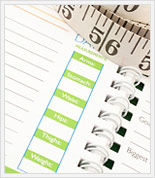 |
Already a member? Secure Login
|

- Ideal Weight Calculator
- Waist-to-Hip Ratio Calculator
- BMI Calculator
- Frame Size Calculator
- Target Heart Rate Calculator

- Good Fast Food
- Recipe Makeovers
- Meal Plans
- Nutrient Facts
- Food Label Claims
- Estimating Serving Sizes



Track Body Fat - Not Body Weight
 Most people will monitor their body weight when trying to lose weight - makes sense right? Well, not always. When you undertake a nutrition and exercise program to get in shape, what most people are really attempting to do is to "re-shape" their body. This often times is accompanied by an actual loss of body weight, but not always. Although body weight is a common means of tracking progress, it is not the best measurement. Ideally, you actually want to monitor body composition (i.e., the amount of body fat and muscle that you have), not body weight.
Most people will monitor their body weight when trying to lose weight - makes sense right? Well, not always. When you undertake a nutrition and exercise program to get in shape, what most people are really attempting to do is to "re-shape" their body. This often times is accompanied by an actual loss of body weight, but not always. Although body weight is a common means of tracking progress, it is not the best measurement. Ideally, you actually want to monitor body composition (i.e., the amount of body fat and muscle that you have), not body weight.If you have been inactive in the past and are starting an exercise program, you may actually see an increase in body weight due to an increase in your muscle mass and body water. This is not a bad thing; this is a very good thing! The more muscle you have, the higher your metabolic rate…translation, the higher your metabolic rate, the more calories your body burns. Contrary to popular belief, the key to long-term weight loss is not necessarily burning a lot of calories by exercising, but exercising to become more fit. Your body can then, in turn, burn more calories all day long and through the night. Fitter bodies utilize more calories than unfit bodies!
The reason why you see an increase in body weight as you gain muscle is that muscle is more dense than fat. Another way to interpret this is that pound for pound, muscle takes up less area or space than fat. For instance, if you replace five pounds of fat with five pounds of muscle, you will look leaner and will have lost inches in your circumference measurements, even though your body weight stays the same.
Even if you see an initial increase in body weight with the start of an exercise program, don't worry. With proper diet and exercise, your body, with the aid of that increased muscle mass, will eventually burn up any excess fat stores that it harbors.
To track your body fat, there are advanced methods of body composition assessment that are available at hospitals, fitness centers and university exercise science labs. Common methods include skinfolds, underwater weighing, and bioelectrical impedance. But buyers beware - ALL methods have various errors associated with them, most require trained technicians and pre-test guidelines, and some give more accurate results than others. After all, these are indirect methods. The only direct means to assess your body fat with 100% accuracy would involve dissection if you get my drift. Whichever you choose, make sure you understand the limitations of the results that you are given - ask a lot of questions! Competent technicians will be able to guide you in properly interpreting your test results.
Even if you do obtain body composition measurements, few people can resist the urge to step on a scale periodically so it's important to understand what the scale is actually telling you. The key to correctly interpreting body weight is to understand the limitations imposed by this method. Body weight can fluctuate drastically from day to day and any abrupt weight change is most likely due to changes in body water, either from water retention (pre-menstruation, high sodium intake, etc.) or dehydration (loss of water through perspiration following exercise, diuresis due to an atypical intake of caffeine or alcohol, etc.). Therefore these sudden weight changes are not due to body fat alterations and are no cause for panic or celebration!
Gradual changes in body weight, over weeks and months, are more likely to represent true changes in body composition and are due to actual changes in fat stores and muscle mass. If you do decide to use body weight, combine it with circumference measurements to better track your progress. Another good option is to totally forego the scale and track your progress by how your clothes fit.
Although I highly recommend obtaining baseline measurements and subsequently monitoring them for motivational purposes, they should only be used as a tool. Don't become a slave to them! Remember, how much you weigh is not as important as what composes a given body weight, and this is not as important as some of the other benefits that you will reap. Tracking body weight and/or body composition is only an indirect means to identify progress in your program, and should not be the ultimate goal of your program.

Our expert, Dr. Sharon E. Griffin, holds a B.S., M.S., and Ph.D. in the areas of exercise science/physiology. She also holds a second M.S. degree in Nutrition and is a licensed nutritionist and an ACSM certified health and fitness instructor.
© 2025 MyFoodDiary.com. All Rights Reserved.